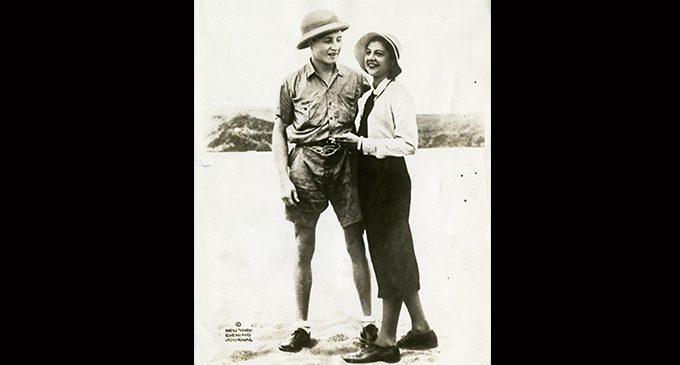SMITH’S STORY – BEFORE THE MURDER – PART 1

This is a story that is unfortunately reported numerous times every day in newspapers around the country. The only difference is that this story took place on July 6, 1932, in the main house of the Reynolda Estate on Reynolda Road in Winston-Salem. Every family has its share of secrets and tragedies. This is the story of one local family that has been shrouded in rumor and a mystery that still eludes solving.
By Judie Holcomb-Pack
Zachary Smith “Smith” Reynolds was the youngest child of R.J. and Katharine Smith Reynolds of the Reynolds Tobacco Company. Smith had a daring, risk-taking streak that from an early age lured him into an interest in aviation. At just 16 years old, Smith received his private pilot’s license and the next year became the nation’s youngest transport pilot. His risk-taking adventures continued as he became an accomplished stunt pilot, competing alongside Amelia Earhart and meeting Charles Lindbergh on the air show circuit.
Just after turning 18, he married Anne Cannon, heiress of Cannon Mills, the world’s leading producer of towels and bedsheets. A daughter, also named Anne, was born before Smith and Anne divorced in Reno, Nevada. By that time, Smith’s affections had turned to a Broadway torch singer named Libby Holman. Smith’s ability to fly wherever he wanted allowed him to trail Libby as she performed across the country (what we’d probably define as “stalking” today). The attention finally paid off and five days after his divorce from Anne, he and Libby were married on Nov. 29, 1931, in Monroe, Michigan, while Libby was touring with “Three’s A Crowd.”
Although Libby was seven and a half years older than Smith and was Jewish, the Reynolds family outwardly accepted her without judgment, although some members of the family were disturbed by Libby’s liberal ways and rumored romantic liaisons. She was called “the smokiest torch on Broadway” for her sultry voice.
Coming from the lights of Broadway to bucolic Reynolda estate, Smith and Libby attempted to create a balance and new life together as a married couple. Living in a home as luxurious as Reynolda gave the couple ample opportunity to entertain both her sophisticated friends and Smith’s aviation buddies. They had been married a brief seven months when on July 5, 1932, they gave an impromptu birthday party for Charles Gideon (“C.G”) Hill, a fellow pilot and grandson of James William Cannon of the Cannon Mills family and coincidentally, a cousin to Smith’s ex-wife, Anne. It was a small gathering and included Smith’s close friend and secretary, Ab Walker.
After the party began to break up, Smith went upstairs to the sleeping porch, a common addition to many Southern homes that is an open air porch that was cooled by summer breezes. Here the stories seem to diverge and rumors began. One person said he heard Smith say he was going upstairs to “end it all,” but the comment wasn’t taken seriously because Smith often leaned to the dramatic. Another rumor was that Smith and Libby got in a fight after he accused her of having an affair with Ab. Or could it be that Smith was pretending to commit suicide by pointing the gun at his head and Libby, not realizing he was joking, grabbed for the gun, unintentionally killing her husband?
What happened next: A shot was heard and Libby screamed, “Smith killed himself!”
The sheriff was called some time after Smith was found shot and he died later that same morning.
Ultimately, Smith’s wife, Libby, and friend, Ab Walker, were indicted for murder.
But was it an unfortunate accident? Or murder? Or was it suicide? And if murder, were Libby and Ab in cahoots with each other, or was one or the other the perpetrator, or someone else on the estate at the time?
Smith died at the age of 20. Immediately after his death Libby announced she was pregnant. They had only been married seven months.
To learn what happened next, read Part 2, Libby’s Story – After the Murder, by Tevin Stinson, in next week’s Chronicle.
To view the exhibit at Reynolda, including archival documents, photos and items, visit reynolda.org for ticket information. Hours of operation are Tuesday-Saturday, 9:30 a.m. – 4:30 p.m. and Sunday from 1:30-4:30 p.m. Free passes are available at all branches of the Forsyth County Public Library.









